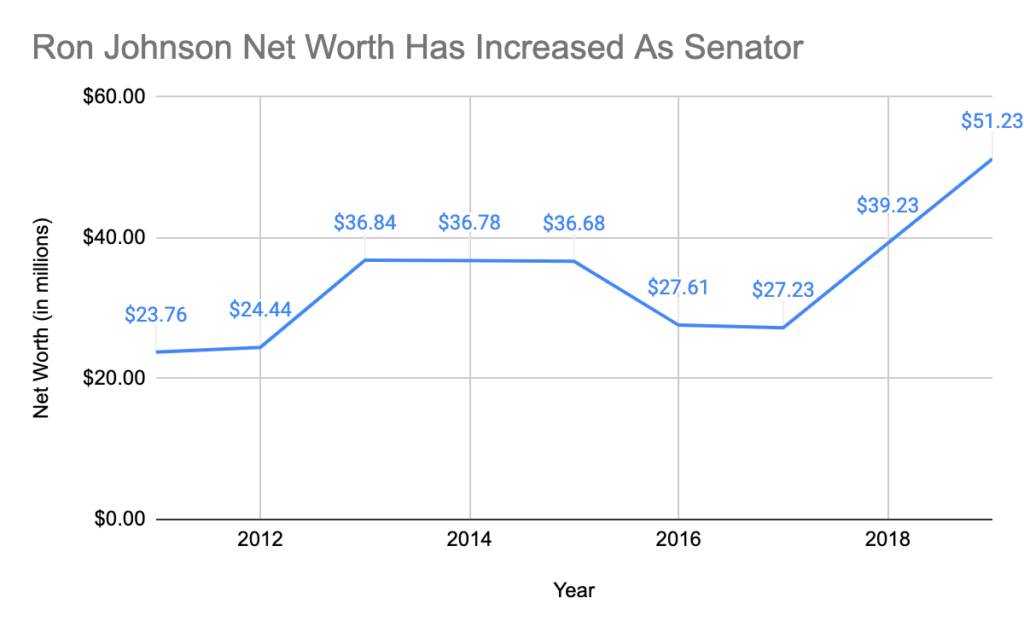From: Michael Czin, Senior Advisor for Congressional Integrity Project
To: Interested Parties
Date: September 23, 2020
Re: How Ron Johnson Has Enriched Himself While in Office
——————————————————————————————————————————-
Earlier today, Senator Ron Johnson released a nearly 90-page report rehashing foreign propaganda and debunked conspiracies in an effort to smear a political opponent. While Johnson is quick to try to impugn the integrity of others, he has systematically used his powerful position in the Senate to advance policies that have helped him grow his fortune.
Newly filed – and previously unreported – Personal Financial Disclosures (PFDs) highlight the extent of how Johnson has profited off his office.[1]
TOPLINE TAKEAWAYS FROM JOHNSON’S 2019 PFDs
Johnson’s estimated net worth in 2019 was between $18,101,013 and $84,366,000, which averages $51,233,506.50, making Johnson one of the richest Members of Congress. His net worth increased by an estimated 30.6% from 2018 to 2019.
Johnson’s likely net worth has increased by more than 115% since 2011, when he was sworn into the Senate.
Here’s a short overview of how Johnson’s has consistently benefitted from his time in Washington:

FACT CHECKING JOHNSON’S CLAIMS ON HIS FORTUNE
This Summer, the Congressional Integrity Project released an analysis on Johnson’s corruption and self-dealing which highlighted how his wealth has likely doubled since running for the Senate. In response, Johnson went on WISN’s UPFRONT where he incredulously claimed that the stat is “completely false, my net worth has not grown by that amount.” He went on to claim that he has lost “huge sums of money.”
Johnson’s 2019 PFD proves that not only did he likely not lose “huge sums of money,” he in-fact made huge sums of money last year.
JOHNSON’S BROKEN BLIND TRUST PROMISE
During his 2010 campaign, Johnson promised to place his assets in a blind trust to ensure that he would legislate in the public interest. That did not happen. Instead, Johnson said he decided to cash out his assets — except he did not fully do that, either. He continued to hold a stake in his personal business and at least one foreign-owned asset.
HOW JOHNSON WENT FROM RICH – TO RICHER
In 2017, Johnson cast the deciding vote for the Republican tax bill — but only after winning changes to the bill that lined his own pockets. Before providing the crucial 50th vote, Johnson successfully pressured Senate leadership to lower taxes for passthrough businesses, or businesses whose owners report profits on their individual tax returns. Those changes significantly lessened the tax burden on companies like Pacur, still run by Johnson’s brother. That, in turn, would be expected to increase the value of Johnson and his family’s stakes.
In short, Johnson advanced policies that he personally benefited from. That’s the textbook definition of corruption.
PACUR VALUATION MYSTERY?
In the late 1970s, Johnson’s father-in-law set him and his brother-in-law up with Pacur, a plastics manufacturing company. Time and again Johnson has used his stake in the company to his political and financial advantage. While he sold his stake earlier this year as the pandemic swept the country, the terms of the sale continue to be shrouded in mystery.
Here’s what we know:
- After Johnson won election in 2010, Pacur immediately paid him “deferred compensation” of $10 million —more than the almost $9 million he had spent to fund his own campaign. The deferred compensation amount, which Johnson approved himself, effectively allowed him and his company to skirt laws limiting corporate campaign contributions.
- In Johnson’s 2018 PFD, he claimed his stake in the company was worth between $1 – $5 million.
- In 2020, Johnson sold his stake in the company for between $5 – $25 million, but according to NBC News, “the terms of the deal prohibit him from disclosing the amount of the sale.”
- In Johnson’s 2019 PFD, he lists his stake in Pacur as generating up to $100,000 in revenue in that year.
If you’re confused about how much Johnson has made – and is making – from his family’s business that has directly benefited from policies he’s advanced in the Senate, you’re not alone. That is why the Congressional Integrity Project has called on Johnson to put his money in a blind trust and disclose all tax returns from his decade in office. The people of Wisconsin should be able to judge for themselves how corrupt Ron Johnson is.
OUTSTANDING QUESTIONS
What was Ron Johnson’s net worth when he ran for office and what is it today?
How have the Johnsons benefitted from the tax cuts for the wealthy that he pushed through?
Johnson’s 2010 Senate campaign pledged to put his assets in a blind trust to avoid any appearance of conflicts of interest. Why did Johnson break his promise?
Johnson sold Pacur to a donor at a private equity firm that presumably is now benefiting from a tax break that Johnson championed. The tax provision Johnson sought may have increased the value of Pacur, meaning he may have benefitted. How much did he sell Pacur for, and what were the terms? As a public official, Johnson should be transparent with the people of Wisconsin about his financial dealings.
[1] The Senate’s PFDs require only approximate ranges of values for each holding. This flawed system allows Senator’s to conceal their true wealth and makes it impossible for the public to gain a precise understanding of each Senator’s wealth. While imperfect, it is the best tool for voters to understand how their elected officials are faring financially while in office. At the Congressional Integrity Project we follow the Center for Responsive Politics’ methodology for calculating wealth, whereby we average the minimum and maximum value of each asset.